
February 2004 Issue Highlights
For more complete coverage, send us an e-mail to
request a back issue.

For more complete coverage, send us an e-mail to
request a back issue.
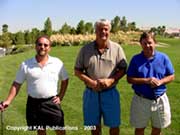
Nevada Petroleum Marketers Association Golf
Tournament
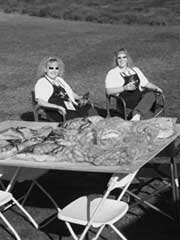
Beneto Golf Tournament
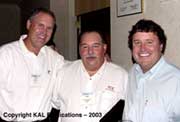
PMAA Meeting
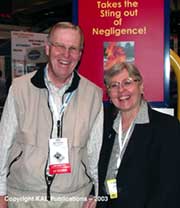
NACS/PEI Joint Convention
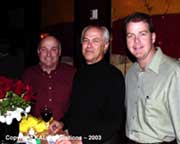
Automotive Aftermarket Industry Week
Want to see the photos that didn't make the issue? Check out
the Cutting Room
Floor.
Santa Fe Okays Sam's Club Station
Hawaii Settles UST Penalty Cases
DOE Funds Tribes' Energy Projects
Kinder Morgan Fined for 1993 Problems
Carwash Tips to Help Stop a Water Ban
SANTA FE, NM. — The city's Planning Commission has unanimously approved a request from Sam's Club to build a gasoline station, a plan that could bring cheaper street prices to Santa Fe, home of some of the highest gasoline prices in the state.
Among those attending the Commission meeting was Mayor Larry Delgado who criticized the city's high gasoline prices and the "gas cartel" that causes them.
Resident Virgil Vigil said motorists were "held hostage" by the "gas cartel" which, he said, had eliminated competition in the fuel business in Santa Fe.
"All I'm asking for is a fair-market value for gas," he said. "Only somebody like Sam's Club can do it."
Another resident said she often fills up five 5-gallon cans on her trips to Albuquerque because she is "sick and tired of paying Santa Fe's inflated gas prices."
Only one person at the meeting was opposed to the Sam's Club plan. Darryl Lewis, a neighbor of Sam's Club, said the gasoline pumps would cause irreparable harm with pollution, traffic congestion and noise.
WASHINGTON, D.C. — The state of Hawaii has agreed to settle five cases involving underground storage tank fines, bringing in over $83,000 in penalties.
The largest of the penalties settled was by Commercial Enterprises Ltd. The company agreed to pay $45,528 for alleged failure to inform the Department of Health of the existence of two tanks at 935 Queen Street, failing to upgrade or close the tanks by Jan. 28, 2000 and failing to meet financial responsibility requirements for the tanks.
Hawaiian Dredging Construction Co., was fined $17,800 for alleged installation and operation of four tanks without obtaining a permit.
Maui Prince Hotel LLC paid a $10,000 fine for alleged failure to inform the Department of the existence of a UST as well as failure to upgrade or close the tank by the January 2000 deadline.
Kauai Veterans Memorial Hospital paid $5,400 for alleged failure to upgrade an emergency generator tank with corrosion protection and continuing to operate the tank in its "substandard" condition.
The City of Honolulu paid $5,400 for alleged failure to obtain a permit to install and operate a 2,500 gallon diesel tank for use in an emergency generator.
Hawaii officials reported that they issued 206 field citations in the period of March 2002 to May 2003. These citations totaled another $186,400 in fines.
There are 2,035 regulated USTs operational in Hawaii.
GOLDEN, CO. — The U.S. Department of Energy will grant $3 million to 16 Native American tribes to help them develop renewable energy projects on tribal lands.
Eight of the tribes are located in the West.
"With financial and technical support from the Department of Energy, these tribes can take the steps in developing energy resources that can lead to a stronger economy, more jobs, and a better life for trial members," said Secretary of Energy Spencer Abraham, announcing the grants.
The projects to be funded by the DOE (and the amounts awarded) include:
PHOENIX, AZ. — Kinder Morgan was fined $20,000 in December for a safety violation on their Arizona pipeline — violations that were discovered in 1993.
When the problem was discovered, Kinder Morgan Energy Partners did not own the pipeline which connects Los Angeles with Phoenix. At that time, it was owned by Santa Fe Pacific Pipeline Partners which sold the pipeline to Kinder Morgan in 1998.
The Federal Office of Pipeline Safety issued the fine for failure to install a pipeline safety valve on the western side of the Gila River in Yuma, CA. The safety valve is mandated at every river crossing in an attempt to protect the water from spills.
The violation was discovered by an Arizona state inspector after a flood exposed part of the pipeline by the river. Arizona, however, had no authority to act on the violation because it was an interstate pipeline so it turned over its findings to the Federal government.
A decade later, the Federal government acted by issuing the fine. Damon Hill, speaking for the Office of Pipeline Safety, said that the delay had been caused because it was a "complicated case."
LAS VEGAS, NV. — With water supply a major issue, carwash owners discussed "How to Prevent a Water Ban" at the recent Car Care World Expo.
Here are a few of the tips offered to the audience from the carwash owners and operators that can be used by anyone looking to increase their profitability — and reputation as a water conserver.
1. Meet with your local regulators, suggested Doug Christ, Eagle Investments, Denver, CO., and let them know how little water you use and the water recycling equipment you have in place. Once they know how effective you are at utilizing water, they can become industry advocates.
"Use the International Carwash Association data to show the actual water use at your carwash. Without meeting at the table with Colorado cities, we wouldn't have anything to work with," he said. "Water departments know we're low water users but they also know we're highly visible. They have to field complaints. In our area, 50% of water is used in landscaping so that's where they go. But they get the calls that say 'I can't water my lawn but their carwash is wasting all this water.' What they need from you is ammunition."
2. Pick your battles wisely. You can't win every fight or avoid every restriction, cautioned Christ, so choose the fights you can win. "For example, water use industrial surcharges are generally put on all users equally across the board. They're very low compared to what a soda bottler would use or a potato chip manufacturer would use. So let the big guys fight the battle for you."
3. Know your equipment. If you're using low-flow carwash nozzles or other equipment that helps conserve water, keep a record of it. Know how much water you're saving by its use and keep those figures handy for when you're talking to the public, regulators, or legislators.
And if you buy new equipment, be sure to update your records. "Remember to document the nozzles that come with your equipment and the flow they have," said Neil Hitchcock, Oasis Development and Management, Ocean City, MD. "That way, when you replace them with low-flow nozzles, you'll get credit for it."
4. Sell yourself as a business that conserves water. "Put a sign in your tunnel: We're a Water-Saving Carwash," suggested Jeff Gheysens, Sparkle Kleen Automatic Carwash, Bridgeton, NJ. "People will see that and be surprised. They'll tell you, 'I didn't know that.' It's an important message to get out."
Originally published in the February 2004 issue of O&A Marketing News.
Copyright 2004 by KAL Publications Inc.
Serving the 13 Western States, the World's Largest Gasoline, Oil, Fuel, TBA and Automotive Service Market